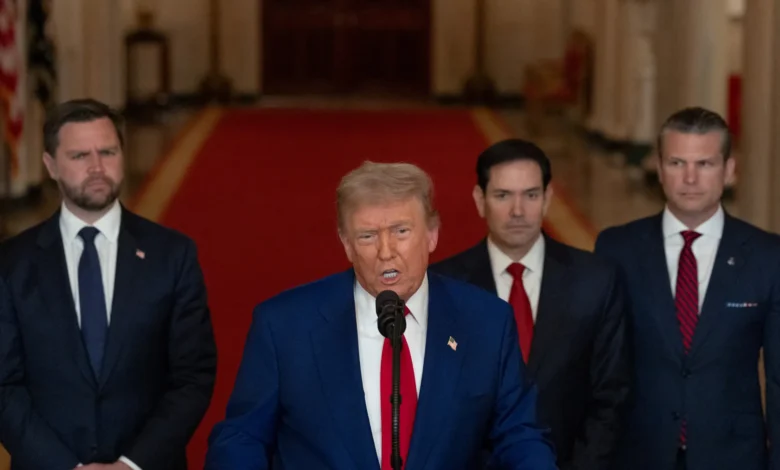
Did Trump Have the Legal Authority to Strike Iran? A Closer Look at the Debate
The world watched in alarm as the United States officially entered Israel’s conflict with Iran late Saturday night. President Donald Trump authorized targeted airstrikes on three of Iran’s nuclear facilities, declaring the mission a “spectacular military success.” However, as explosions echoed across the Middle East, a louder debate erupted back home: Did Trump overstep his authority by bypassing Congress?
This critical question has sparked heated discussions among political analysts, lawmakers, and constitutional scholars, raising fresh concerns about the balance of power between the executive branch and Congress in wartime decisions.
Presidential Power vs. Congressional Authority
Under Article II of the U.S. Constitution, the president holds the role of commander-in-chief, granting him the authority to use military force to protect the United States and its citizens against actual or anticipated attacks. This clause has often served as the legal basis for U.S. presidents, regardless of party affiliation, to initiate military action without prior congressional consent.
Historically, several presidents have exercised this power. From Democratic to Republican administrations, military interventions have taken place without formal declarations of war, as documented by the Council on Foreign Relations (CFR).
At the same time, Article I of the Constitution gives Congress the exclusive authority to “declare war.” However, this provision has never been interpreted as requiring congressional approval for every military engagement. Instead, it’s often a matter of legal nuance and political judgment.
The War Powers Resolution
Passed in 1973, in the wake of the Vietnam War, the War Powers Resolution was designed to rein in the president’s military powers by requiring notification and approval from Congress for prolonged military engagements. It allows the president to act unilaterally in case of sudden or emergency threats but mandates a report to Congress within 48 hours, with military operations limited to 60 days unless further authorized.
Critics argue that Trump’s decision to strike Iran without securing congressional authorization goes beyond this emergency threshold. Supporters, however, claim the president acted within his constitutional rights to protect national and allied interests.
Lawmakers React
Trump’s military move triggered polarized reactions across the political spectrum. Senator Bernie Sanders, addressing a rally in Oklahoma, condemned the strike as “grossly unconstitutional,” reinforcing that only Congress has the legal authority to take the country to war.
Echoing this sentiment, Congresswoman Alexandria Ocasio-Cortez warned that Trump had “impulsively risked launching a war that may ensnare us for generations,” calling the act grounds for impeachment. Similarly, Representative Rashida Tlaib asserted that the American public does not support entering another “forever war.”
Meanwhile, voices on the Republican side offered a mix of caution and support. Senate Armed Services Committee Chairman Roger Wicker praised the military operation but acknowledged the tough decisions ahead. Senator Jim Risch, head of the Senate Foreign Relations Committee, labeled it “Israel’s war” but emphasized that disarming Iran served global interests. He reassured Americans: “This is not the start of a forever war. There will not be American boots on the ground in Iran.”
House Democratic Leader Hakeem Jeffries accused Trump of misleading the public, acting without congressional approval, and placing the U.S. at risk of entanglement in a destructive Middle Eastern war. Senator Tim Kaine reinforced this criticism, stating the American people overwhelmingly oppose war with Iran and that the president had displayed “horrible judgment.”
Support from Some Republicans, Condemnation from Veterans
Speaker of the House Mike Johnson, a Republican, defended Trump’s actions, saying Iran had repeatedly refused diplomatic solutions and that the strike was a necessary step to prevent the regime from acquiring nuclear weapons.
On the other hand, Max Rose, a former Democratic Congressman and senior adviser to the veterans’ group VoteVets, didn’t mince words. He called the strike illegal, accusing Trump and his Republican supporters of abandoning their constitutional responsibilities.
When Did the US Last Declare War?
Despite numerous military interventions over the decades, the last formal declaration of war by the U.S. Congress came in 1942, during World War II. Since then, the U.S. has engaged in significant military conflicts in Korea, Vietnam, Iraq, and Afghanistan along with airstrikes and operations in places like Libya, Somalia, and Yemen, often without a formal war declaration.
A Question of Precedent and Responsibility
While Trump’s defenders argue he acted decisively to neutralize a global threat, his critics warn that bypassing Congress undermines democratic checks and balances. The debate underscores a long-standing tension in U.S. governance: how far can a president go in the name of national security?
As the dust settles, one thing is clear: the conversation about war powers, constitutional limits, and global responsibility is far from over. And with each new conflict, the stakes only grow higher.
